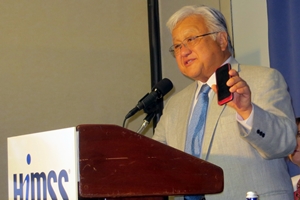
Rep. Mike Honda, D-Calif, says the smartphone can fundamentally change the doctor-patient relationship. (A. Kotok)
HIMSS, an organization in Chicago promoting information technology in health care, is collecting case studies of automation to show its impact on medical practice and health care outcomes. The group unveiled the program, named the Health IT Value Suite, today at a press conference in Washington, D.C., although the collection is not yet available to the public.
The program aims to amass a repository of cases that show the impact of health IT in meeting clinical outcomes and business objectives. Carla Smith, executive vice president of HIMSS, says the value suite has about 500 use cases with qualitative and quantitative data documenting the effects of health care IT in five types of outcomes:
– Improved patient and provider satisfaction
– Improved clinical outcomes, including reduced medical errors and improved patient safety
– Better use of electronic data, such as more population health reporting and increased use of evidence-based guidelines
– Better patient education and preventive health, including increased immunizations and improved disease surveillance
– Financial savings, such as reduced patient wait times, fewer emergency room admissions, and improved inventory control
Smith said the cases were culled from peer-review literature, submissions from HIMSS members, and news stories, and for the most part represent successful implementations of health IT in that “they actually happened.” The organization, says Smith, is eager to collect more use cases, because they can learn from failures as well as the successes.
Representative Mike Honda, (D-Calif) told how the cases collected by HIMSS have the potential to make an impact on policy. Honda, whose district includes Silicon Valley, said advances in health care IT could make fundamental changes in the way health care is practiced, even in changing the doctor-patient relationship. He described how many innovations in health care are focusing on the smartphone, but the lack of certainty in regulations and dearth of investment capital have caused “a brain drain away from the health care space.”
Groups like HIMSS, said Honda, are helping the industry communicate better with policy makers to reduce uncertainty. Last month, Honda reintroduced the Healthcare Innovation and Marketplace Technologies Act that establishes an Office of Wireless Health at the Food and Drug Administration to a encourage more predictable regulatory framework, and an mHealth support program at the Department of Health and Human Services to help mobile health app developers conform to privacy standards.
HIMSS appears to still be collecting the cases. The Web page for the collection today (16 July 2013) offers only a description of the program and not any access to the cases themselves.
Read more:
- Health Records Exchanges Grow, but Sustainability a Question
- Simplified Medicare Could Save Money, Improve Senior Health
- Emergency Care Costs Likely Higher than Current Estimates
- Student Develops Heart Health Management Smartphone App
- Recommended Heart Failure Meds Save Lives, and Maybe Money
* * *

 RSS - Posts
RSS - Posts
You must be logged in to post a comment.